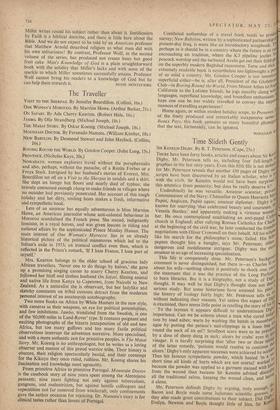The Traveller
NOWADAYS, women explorers travel without the paraphernalia and also, perhaps, without the panache, of a Rosita Forbes or a Freya Stark. Intrigued by her husband's stories of Everest, Mrs. Bourdillon set off on a Visit to the Sherpas in sandals and a skirt. She slept on lumpy hut floors and nearly died of typhus; she bravely consumed enough chang to make friends in villages where no outsider had previously penetrated. Her account of this tough holiday and her dirty, smiling hosts makes a fresh, informative and sympathetic book.
Less of an amateur but equally adventurous is Miss Marvine Howe, an American journalist-whose anti-colonial behaviour in Morocco scandalised the French press. She stayed, indignantly feminist, in a royal harem, and was given lessons in riding and national affairs by the sophisticated Mince Moulay Hassan. The main interest of One Woman's Morocco lies in an already historical picture of the political manceuvres which led to the Sultan's exile in 1953; an ironical conflict even then, which is reflected in the Prince's remark, 'If I hate France, I hate part of myself.' • Mrs. Kearton belongs to the older school of gracious lady African travellers. 'Never one to do things by halves,' she gave up a promising singing career to marry Cherry, Kearton, and fojlowed her bluff and tireless husband On Safari, filming animal and native life from Kenya to Capetown, from Nairobi to New Zealand. As a naturalist she is observant, but her ladylike and sketchy comments on tribal customs detract from the moderate personal interest of an amateurish autobiography.
Two more books on Africa by White Hunters in the new style, with cameras as their weapons, an eye for political potentialities, and few inhibitions. Jambo, translated from the Swedish, is one of the '60,000 miles in Land-Rover' type. It contains poignant and exciting photographs of the bizarre juxtaposition of old and new Africa, but too many guffaws and too many facile political observations interrupt the adventure narrative. More specialised, and with a more authentic zest for primitive peoples, is The Masai Story. Mr. Koenig is no anthropologist, but he writes as a loving observer and mentor of this proud warrior tribe. Their history is obscure, their religion spectacularly bestial, and their contempt for the Kikuyu they once ruled, ruthless. Mr. Koenig shares his fascination and knowledge most agreeably.
From primitive Africa to primitive Portugal. Mountain Doctor is the casebook story of nine years spent among the Alentejano peasants; nine years fighting not only against tuberculosis, gangrene, and malnutrition, but against hostile colleagues and superstition not far removed from witchcraft; only confinements gave the author occasion for rejoicing. Dr. Namora's story is for clinical tastes rather than lovers of Portugal. Combined authorship of a travel book tends to prod° survey; New Babylon, written by a sophisticated partnerships. present-day Iraq, is more like an introductory scrapbook. Th perhaps as it should be in a.coun try where the future is so . encroaching on tradition, where the K3 pipeline jostles peacock worship and the turbaned Arabs get out their field-gl on the superbly modern Baghdad racecourse. Terse and extremely readable book is nevertheless too lightweight a P°r' of so solid a country. Mr. Gordon Cooper is not intentioll, superficial either—he is, after all, President of the GlobetroS Club—in Roving Round the World. From Mount Athos to Mg/ California to the Lofoten Islands, he jogs equably along Will' languages, superficial knowledge, and boundless enthusiasot haps one can be too widely travelled to convey the iroP° nuances of travelling experiences?
Home again, or within modest holiday scope, to Provence. of the finely produced and remarkably inexpensive series Beaux Pays, this book contains so many beautiful phot0go3 that the text, fortunatelY, 'can be ignored. MARi(,OiD II










































 Previous page
Previous page